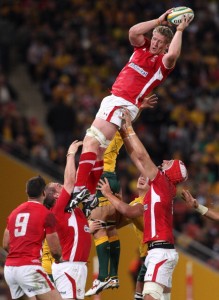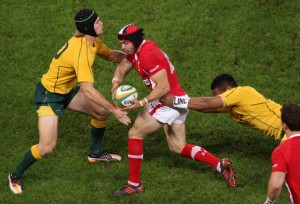
Slow service: Mike Phillips' game has many strengths but it was Will Genia's speed of thought shone in Brisbane
Wales couldn’t cope with the game speed
THE DIFFERENCE in playing styles between the northern and southern hemispheres maybe narrowing, but the speed at which it is played is not. Wales really struggled with the pace at which the Wallabies played, particularly their ruck speed which was noticeably quicker. But it wasn’t just the speed of play that was rapid; the speed of thought was too. Will Genia typified this sharp thinking. He had clearly done his homework on the Welsh ruck defence and consistently ran and fed the wider channels, bypassing Lydiate and Warburton, who regularly defend as first and second tackler in the ruck defence. Genia’s speed of thought was also further highlighted by the comparison with his opposite number. If Genia’s thought processes were measured in nano seconds, Mike Phillips’ could have been measured using a sundial. His decision to run two quick penalties from his own 22 was naïve, especially when the Welsh lineout was so dominant.
Sloppy at the breakdown
Wales were unusually careless at the ruck, and it was their worst performance at the breakdown for some time. Wales seem to think that the ruck is completed when the ball arrives at the scrum half’s feet. It isn’t. The ruck is only complete when the ball has left his hands and is safely on its way to the first receiver. Until that point everybody involved in the contact situation, including the scrum half, needs to watch for the counter ruck. But Wales didn’t and it allowed the Wallabies numerous opportunities to waft their limbs towards a poorly defended ball. And it wasn’t just the Aussie limbs that caused Wales issues, their own legs were a problem too. Too often on Saturday, a stray Welsh size 12 would knock their own ball loose. Sloppy.
Wales missed Jamie Roberts
Wales missed Jamie Roberts on Saturday. There is only one thing more predictable than his ball carrying, and that’s its effectiveness. There are many No 12’s in the world that can ‘crash, bang’, but Roberts brings the ‘wallop’ too. His ball carrying is part of the Welsh teams’ DNA. It is the platform around which all phases are built and yesterday Scott Williams was unable to fulfil the role. It meant that Wales were never able to cross the gainline in midfield. Even when Jon Davies occasionally switched in to the second receiver role, his carrying fell short of what we now expect from a Welsh No 12. The lack of a ‘carrying’ No 12 also affected Rhys Priestland’s game. When in doubt, Priestland simply ships the ball to Roberts who sucks it up and takes the contact – on Saturday, his ‘get out of jail free card’ simply wasn’t there.
Wales dominated the lineout, but didn’t capitalise
Wales’ lineout worries have eased considerably over the past eight to 12 months. What was once Wales’s Achilles heel has now become their crutch. On Saturday their lineout had a 100% completion rate, 14 from 14, compared to Australians 75%, six from eight. But despite dominating the touchlines, Wales didn’t really kick to them, opting to kick infield instead. This wasn’t helped by numerous lethargic kick chases – yet another aspect of the game in which Jamie Roberts was missed. Roberts regularly leads the kick-chase line, ensures its rigidity and is invariably the first defender to arrive in the landing zone. He’s also not the sort of player that you want to see charging towards you when you have your arms trained on the ball and your ribs exposed.
Leigh Halfpenny is an international kicker
Leigh Halfpenny is a good goal kicker. He has been for some time. But on Saturday, he became a world-class goal kicker. Halfpenny has taken a long time to shake the tag of being a distance specialist – he was in danger of becoming Wales’s Francois Steyn. In Brisbane he was 100% with the kicking tee, five from five. Halfpenny’s kicking style produces a very straight ball flight, which fades slightly left to right. There are rarely any big arching, nail biting, “is it? will it? won’t it?” kicks at goal. You can tell if the ball is going over the posts when it is three yards from his boot. It was a very neat display.







